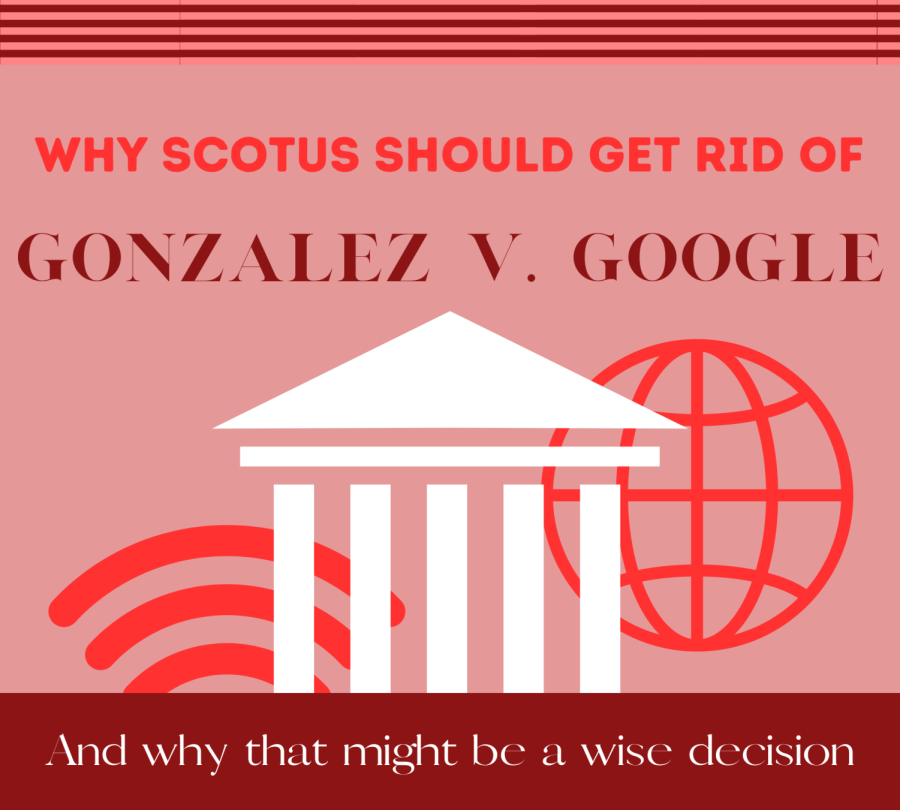SCOTUS will likely abandon Gonzalez v. Google — and that might be the way to go
SCOTUS should get rid of Gonzalez v. Google.
March 30, 2023
Last year the Gonzalez family appealed to SCOTUS for their lawsuit against Google, hoping to see Section 230, which prevents internet companies from being held liable for any harmful content posted on their platforms, be rendered unconstitutional.
The reasoning behind their stance against Section 230 is that it helps internet platforms avoid accountability for displaying virtually any kind of harmful content, especially when it is openly recommended to users by the platforms via built-in algorithms.
The justices heard the case two weeks ago. By the end of the hearing, none of the justices seemed particularly convinced by the arguments presented from either side.
“You know, these are not like the nine greatest experts on the internet,” said Justice Elena Kagan during the hearing.
The justices were particularly uncomfortable with the fact that neither side was willing to compromise when it came to their stance on Section 230- it was either repeal the law or preserve it entirely.
“I don’t know where you’re drawing the line,” Justice Samuel Alito told Eric Schnapper, the lawyer for the Gonzalez family. “That’s the problem.”
To refrain from making a decision that might drastically alter the future of the internet, Justice Amy Barrett suggested that justices rule against letting people file lawsuits concerning terrorist activity within internet platforms in Twitter v. Taamneh, which was heard the following day.
“So if you lose tomorrow, do we even have to reach the Section 230 question here? Would you concede that you would lose on that ground here?” Barrett questioned Schnapper.
At first glance it might seem like the justices are indirectly ruling for Google by refusing to rule on the case and thus preserving Section 230, but the reality is much more complicated.
Taking a closer look at the consequences of making a decision on Gonzalez v. Google might shed light on why the justices would rather prefer opting out of ruling on this case.
Lisa Blatt, a lawyer for Google, gave two scenarios in case Section 230 is repealed- Either companies will began to constantly moderate their platforms at the cost of user expression and speech, or they will let their platforms run without any kind of content moderation.
In either case the internet will become an unsafe digital space for users, effectively wiping out the multi-billion dollar market thriving within its illusory confinements.
“If the Court rules in a way that goes against Section 230, internet companies will have to completely change their approach with algorithms…If the Court rules in a way that adheres to Section 230, it might lead to issues about whether there is a way to make the internet safer,” said Comp Civics student Simran (?) (‘23).
Secondly, the justices do not have the expertise to deal with a question of such technical complexity and thus have a lesser ability to make a decision on such a detail-heavy case.
It is a matter best left to the other branches, where committees with expertise on the subject of Section 230 would be able to come about a more educated decision.
“I don’t think it’s fair to put it on the Supreme Court to do that. And obviously, the executive branch doesn’t have the authority to do that,” said AP Gov teacher Michael Boone.
SCOTUS doesn’t have the authority to make such a decision anyway. Section 230 is not a matter of simple judicial review- it is a case best left to Congress, where they can reform the law rather than repeal or preserve it.
“I think this is one of those situations where Congress or the FCC might be better prepared to work out a legal remedy,” said (?) (‘23).
That might be a challenging ordeal however, considering Congress’ sharp bipartisan divide where even a remotely consensus decision is nigh impossible- all the more reason for SCOTUS to dodge the case and wait for Congress to repair itself.
“I think it needs to be a collaboration between the private sector and Congress… But again, that requires leadership, which, we talked about Congress being dysfunctional, so that’s probably not going to happen,” said Boone.
Section 230 is a contentious law that cannot simply be repealed or preserved- it requires extensive reforms to be functional in today’s post-algorithm digital society.
However, the political turmoil in the American government has made it impossible for the law to be reformed via Congress. Thus, it may be imperative that SCOTUS doesn’t make a decision beyond its station, as it risks possibly compromising the future of the most promising innovation to come out of the 20th century- the internet.
The rulings to both Gonzalez v. Google and Twitter v. Taamneh will come out in early summer.





